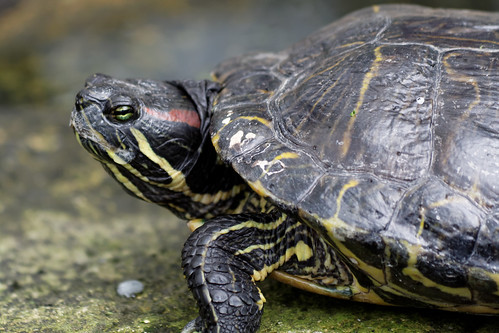The point of this post is not to teach or explain anything directly. Instead of walking through the steps of an idea, I am going to tell you three stories. The stories are meant to get you thinking. In my opinion, all three of them point to a single topic.
By design, there are no straightforward answers given here… not even the name of the topic. (Hint: It’s not “turtles.”)
The Little Old Lady
A well-known scientist (some say it was Bertrand Russell) once gave a public lecture on astronomy. He described how the earth orbits around the sun and how the sun, in turn, orbits around the center of a vast collection of stars called our galaxy. At the end of the lecture, a little old lady at the back of the room got up and said: “What you have told us is rubbish. The world is really a flat plate supported on the back of a giant tortoise.” The scientist gave a superior smile before replying, “What is the tortoise standing on?” “You’re very clever, young man, very clever,” said the old lady. “But it’s turtles all the way down!”
Steven Hawking, A Brief History of Time
The old lady in this story has a strange scenario in mind. The Earth, she says, is sitting on a turtle. That turtle is standing on a second turtle. The second turtle is standing on a third. And so on: turtles all the way down.
Of course, giant space turtles are impossible in a practical sense. No one really takes that part of the argument seriously. But the old lady’s reasoning holds a deeper logical flaw.You probably got a sense of it when you read her words. There is something not quite right, though what exactly is wrong may not be immediately obvious.
The issue lurks somewhere the old lady’s final statement. Even if there are turtles holding up the Earth, they cannot go “all the way down.” Her scenario provokes discomfiting questions: How far is down? How many turtles are there? How can there be no bottom turtle?
The Footrace
Hawking’s tale is reminiscent of another famous story: the footrace described in one of Zeno’s Paradoxes.
A race has been called between a tortoise and the Greek mythological figure Achilles. Achilles is known for being swift, and the tortoise is slow. Because of this, the tortoise gets a head start.
One imagines the turtle ten yards ahead of the starting point. The race begins. Achilles quickly makes it to the ten-yard line. But by that time, the tortoise has moved further forwards, perhaps to the twelve-yard line.
Achilles can reach the twelve-yard line, but by then, the tortoise has moved still further. Though Achilles gets closer and closer to the tortoise, he can never pass him: whenever he reaches the tortoise’s most recent location, the tortoise will have already moved ahead.
Of course, this is not how things play out in real life. If this paradox governed real motion, all sorts of commonplace things would be impossible. But they are possible, and they happen all the time. A slow runner can lose a race to someone faster. A car in the left lane of a highway can pass a car on the right.
Zeno’s fictional race conflicts with our experience. And yet, when presented this way, his logic is not easy to refute.
The Endless Notebook
“What the Tortoise Said to Achilles” is another paradoxical piece. This one is written by Alice in Wonderland author Lewis Carroll. It is a story about the same characters mentioned in Zeno’s Paradox, and it can be read here.
The Tortoise strikes up a conversation with Achilles, as the two approach the finish line of their race. They start with an innocuously simple question (which I cannot explain better than Lewis Carroll did!) But soon the Tortoise’s dizzying list of inquiries fills up Achilles’s notebook. His ideas never seem to stop.
And in fact they never will. Just as it was with the old lady and Zeno, there is something wrong with the Tortoise’s logic, but it is hard to put one’s finger on exactly what.
There’s an unsettling catch in each of these three arguments. In Hawking’s story, the turtles go “all the way down.” In the footrace of Zeno’s paradox, Achilles gets “closer and closer” to his opponent. And in Carroll’s story, the Tortoise always writes down yet another hypothetical step.
These scenarios are obviously not naturally possible. And yet they hold an appeal. They seem to make sense. And each seems to make sense because it rests on a subtle logical assumption. Somewhere deep in each argument lies a premise that seems true, but isn’t. But what?
Do each of these stories have something in common, besides turtles and tortoises? Are two alike, and one different? And what is the real problem with each argument?
Feel free to comment below.







Once again, another wonderful article! Always a pleasure to read. I’m probably way off, but I feel that part of the appeal to these logical fallacies is the way they play around the idea of limits. The turtles keeps going further down and we naturally think “they must approach a bottom at some point” when in reality, given the circumstances of the story, they don’t. Achilles can get closer and closer to the turtle, but never seems to surpass it. The tortoise can list an endless number of hypotheticals that might possibly lead him closer and closer to believing the ultimate ending statement. I guess it’s the whole appeal of limits and the fact of approaching a given value, yet never surpassing it. I don’t know, that’s what I thought of immediately once i finished reading it. Thanks for boggling my brain in a bit in the morning, totally appreciate it.
Oooh, nice idea! This is related to what I was thinking, although it’s not exactly the same to my mind.
I think that limits are necessary to AVOID this kind of paradox sometimes. For example, as x gets arbitrarily big, what does (1/x) become? If you think of it in terms of limits, it makes sense to say it’s 0. Otherwise, you don’t have an answer at all – just “it keeps changing.”
It seems to me that this kind of reasoning comes from an abuse of the idea of a limit – instead of an arbitrarily large amount, you actually say you have an infinite amount (of turtles or whatever).